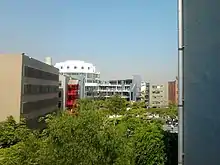Peruvian University of Applied Sciences
The Universidad Peruana de Ciencias Aplicadas (UPC) is a private university in Lima, Peru, founded on January 5, 1994. Currently, it offers 46 career programs categorized in 13 schools.[2]
Universidad Peruana de Ciencias Aplicadas | |
 | |
Other name | UPC |
|---|---|
| Motto | Exígete. Innova. UPC. |
Motto in English | Push yourself. Be creative. UPC. |
| Type | Private |
| Established | January 5, 1994 |
| Founders | Graciela Bancalari David Fischman Alfredo Miró Quesada Mariana Rodríguez |
| Affiliation | Laureate International Universities |
| Rector | Dr. Edward Roekaert Embrechts[1] |
Academic staff | 3,336 (2017) |
| Students | 27,318 (2017) |
| Undergraduates | 20,113 |
| Postgraduates | 7,205 |
| Address | Av. Prolongación Primavera 2390, Los Álamos de Monterrico, Santiago de Surco , , 12.1041°S 76.9630°W |
| Campus | Urban Monterrico Campus: 3 hectares (7.4 acres) |
| Colors | Gray Red |
| Nickname | UPC |
| Website | www |
History
The Universidad Peruana de Ciencias Aplicadas was created by Law No. 26276 on January 5, 1994.[2] On March 28, a ceremony took place in the campus of Santiago de Surco in Lima, where the first stone was placed. The first admission was on August 4, 1994 and on September 15, the first university courses started with the faculties of engineering, architecture and communications.
In March 1995, the university held a debate called "Creatividad Presidencial" (Presidential Creativity) between Javier Pérez de Cuéllar and Alberto Fujimori. In that same year, a new system of admission called Selección Preferente was created, for those students who had finished high school in the upper third ranking of their classes.
In 1996, the faculty of business management was created, containing programs in finance, marketing and accounting. In the same year, pavilion B was founded.
In 1997, the Escuela de Negocios de la UPC (Business School of UPC) is founded. It is now known as Escuela de Postgrado de la UPC. In 1998, the faculty of law was founded while in 2000, the faculty of economics.
In September 2004, the university affiliated with the network of private universities called Laureate International Universities. The next year, the university created the División de Estudios Profesionales para Ejecutivos, which connected into one single program the Programa de Eduación Superior Complementaria, which was focused on graduates of college.
In 2006, the faculties of health, humanities and hotel administration. In 2009, the faculty of arts and music were founded.
In 2011, the faculty of design was created and the first year of classes at the San Isidro campus was inaugurated. The following year the faculty of education was created and the first academic year of undergraduate at the Villa campus was inaugurated; and in 2015, the San Miguel campus is inaugurated and the psychology faculty is created.[3]
Campuses

The Universidad Peruana de Ciencias Aplicadas has a main campus in [Santiago de Surco]], Lima, Peru. It is known as el Campus Monterrico, which has a size of 3 hectares. Another campus was built in San Isidro, Lima, Peru. This campus is known as the "San Isidro campus". In 2013, the Villa campus (in the district of Chorrillos) was purchased. In 2015, the San Miguel campus was purchased, which is located in the district of San Miguel in Lima, Peru. The Villa campus has several sectors dedicated to sports.[3]
Professional careers
Currently the Peruvian University of Applied Sciences has 46 professional careers.
These careers are within 13 faculties:
Administration in Hospitality and Tourism, Architecture, Contemporary Arts, Health Sciences, Human Sciences, Communications, Law, Design, Economy, Education, Engineering, Business, Psychology
References
- "Lideres académicos y autoridades de la UNIVERSIDAD PERUANA DE CIENCIAS APLICADAS S.A.C". DatosPerú.org (in Spanish). Retrieved January 19, 2019.
- "History". upc.edu.pe (in Spanish). Lima: Peruvian University of Applied Sciences. Retrieved 24 April 2019.
- "Timeline" (PDF). upc.edu.pe (in Spanish). Lima: Peruvian University of Applied Sciences. Retrieved 24 April 2019.